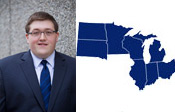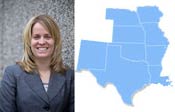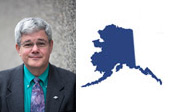Staff at AOPA’s Maryland headquarters and nationwide work in meeting rooms, statehouses, and on Capitol Hill to protect pilots’ freedom to fly. In 2012, the association expanded its presence in communities across the country with the creation of seven new, full-time positions working on state and local issues as well as pilot outreach. These new regional managers worked with headquarters staff to defend pilots’ access to airports, promote tax and economic policies that keep the general aviation industry healthy, and keep the skies safe for GA pilots. As the year drew to a close, the regional managers reflected on top issues that affected pilots in their regions. Visit the Web page of your region to get updates on AOPA’s involvement in your area, including tweets from the regional managers and the Views from the Regions blog.
Northwest Mountain Region: David Ulane
 The aviation industry in Idaho got a boost in March with the passage of a bill that exempted certain aircraft parts, supplies, and other components from sales and use taxes. The new law removed the competitive disadvantages repair shops in the state faced as they competed for business with operators in states that already had the exemptions in effect. AOPA worked with other aviation groups and maintenance, repair, and overhaul operators to advocate for the bill. The Idaho Statesman reported that a major repair shop started hiring in short order.
The aviation industry in Idaho got a boost in March with the passage of a bill that exempted certain aircraft parts, supplies, and other components from sales and use taxes. The new law removed the competitive disadvantages repair shops in the state faced as they competed for business with operators in states that already had the exemptions in effect. AOPA worked with other aviation groups and maintenance, repair, and overhaul operators to advocate for the bill. The Idaho Statesman reported that a major repair shop started hiring in short order.
AOPA Northwest Regional Manager David Ulane said the association’s collaboration with other groups contributed to the success of the bill. “To me, it’s a perfect demonstration of how AOPA advocacy helped better the GA environment, improve local and state economies, and strengthen the Idaho aviation system with a strong, viable network of MROs,” he said.
 AOPA Southern Regional Manager Bob Minter saw the fruits of a years-long effort to revise South Carolina’s Aeronautics Code in 2012. “The new Title 55 law may well be a model for protecting aviation infrastructure at the state level,” Minter said.
AOPA Southern Regional Manager Bob Minter saw the fruits of a years-long effort to revise South Carolina’s Aeronautics Code in 2012. “The new Title 55 law may well be a model for protecting aviation infrastructure at the state level,” Minter said.
Also in the South, the passage of an economic-development package with sales-tax exemptions for aircraft repairs and equipment in Florida improved the business climate for GA in the state in 2012. The bill, supported by AOPA and the Florida Aviation Trades Association (FATA), makes aircraft with a maximum certificated takeoff weight of more than 2,000 pounds eligible for a tax exemption previously available only to airplanes weighing more than 15,000 pounds.
Great Lakes Region: Bryan Budds
 In contrast to previous proposals that would have raised aviation taxes in the state, a new Michigan law ensures that money already being raised from aviation fuel taxes will go back into the aviation system. The law dedicates a portion of tax proceeds from the sale of fuel and other aviation products to the state aeronautics fund instead of the general fund, where all fuel tax revenue previously went. Reinvesting aviation dollars in aviation infrastructure helps keep the state’s aviation system healthy; AOPA Great Lakes Regional Manager Bryan Budds traveled to Lansing on numerous occasions to urge lawmakers to pass the bill.
In contrast to previous proposals that would have raised aviation taxes in the state, a new Michigan law ensures that money already being raised from aviation fuel taxes will go back into the aviation system. The law dedicates a portion of tax proceeds from the sale of fuel and other aviation products to the state aeronautics fund instead of the general fund, where all fuel tax revenue previously went. Reinvesting aviation dollars in aviation infrastructure helps keep the state’s aviation system healthy; AOPA Great Lakes Regional Manager Bryan Budds traveled to Lansing on numerous occasions to urge lawmakers to pass the bill.
Western Pacific Region: John Pfeifer
 In California, proposed legislation would have eliminated 50 state-mandated programs, including the state’s landmark law requiring counties to have airport land use commissions, to help close a budget gap. Western Pacific Regional Manager John Pfeifer explained to the Department of Finance that the proposal would not add money to the general fund, and communicated the importance of the commissions to the Senate Budget Committee. The proposal died in a Senate budget subcommittee, but AOPA will be watching for similar proposals in next year’s budget.
In California, proposed legislation would have eliminated 50 state-mandated programs, including the state’s landmark law requiring counties to have airport land use commissions, to help close a budget gap. Western Pacific Regional Manager John Pfeifer explained to the Department of Finance that the proposal would not add money to the general fund, and communicated the importance of the commissions to the Senate Budget Committee. The proposal died in a Senate budget subcommittee, but AOPA will be watching for similar proposals in next year’s budget.
“These commissions are vital to the protection of airports from incompatible land use development in the airport environs,” said Pfeifer.
Central Southwest Region: Yasmina Platt
 Three aviation-related bills signed by Missouri Gov. Jay Nixon in a single day helped mitigate a safety hazard for pilots, extended a tax exemption on jet fuel sales, and changed provisions for placing a lien on an aircraft. One bill requires anemometer towers more than 50 feet high to be marked so they are visible to pilots—a safety benefit to pilots, particularly those conducting agricultural, medical transport, and other low-level flight operations. Another bill changed provisions for placing a lien on an aircraft by extending the time from 30 days to 180 days in which someone who had performed labor on aircraft parts or equipment may file a lien; the third extends a sales-and-use-tax exemption on aviation jet fuel sales from Dec. 31, 2013, to Dec. 31, 2023. The state also honored aviation with a proclamation recognizing the role of GA and a State Aviation Day.
Three aviation-related bills signed by Missouri Gov. Jay Nixon in a single day helped mitigate a safety hazard for pilots, extended a tax exemption on jet fuel sales, and changed provisions for placing a lien on an aircraft. One bill requires anemometer towers more than 50 feet high to be marked so they are visible to pilots—a safety benefit to pilots, particularly those conducting agricultural, medical transport, and other low-level flight operations. Another bill changed provisions for placing a lien on an aircraft by extending the time from 30 days to 180 days in which someone who had performed labor on aircraft parts or equipment may file a lien; the third extends a sales-and-use-tax exemption on aviation jet fuel sales from Dec. 31, 2013, to Dec. 31, 2023. The state also honored aviation with a proclamation recognizing the role of GA and a State Aviation Day.
“It was a good year for GA in Missouri!” said Central Southwest Regional Manager Yasmina Platt. “We’re hoping for another good year in 2013.”
 In Alaska, where GA provides a lifeline to small, remote communities, AOPA sought pilot feedback on airspace and training issues through two surveys: One asked for information on midair collision concerns in the Matanuska-Susitna Valley, and one on the use of new “practice runways,” said the face of AOPA in Alaska, Regional Manager Tom George. Also, AOPA air traffic staff members continue to object to an airspace plan that would expand a military operations area in an area often used by GA operators and reduce GA access to the airspace.
In Alaska, where GA provides a lifeline to small, remote communities, AOPA sought pilot feedback on airspace and training issues through two surveys: One asked for information on midair collision concerns in the Matanuska-Susitna Valley, and one on the use of new “practice runways,” said the face of AOPA in Alaska, Regional Manager Tom George. Also, AOPA air traffic staff members continue to object to an airspace plan that would expand a military operations area in an area often used by GA operators and reduce GA access to the airspace.
 AOPA testified against a luxury surtax on the sales of aircraft that would have added a 1-percent luxury surtax on purchase sums above $35,000 on “motor vehicles, boats and planes” in Maryland. For items more than $90,000, the surtax would have been $550 plus 2 percent of the amount above $90,000. The state’s legislative session came to a close without action being taken on the tax. AOPA Eastern Regional Representative Craig Dotlo’s efforts also protected hard-won aviation sales tax exemptions in Massachusetts and Connecticut; he also worked to ensure that Department of Transportation reorganizations in those states have no negative impact on aviation.
AOPA testified against a luxury surtax on the sales of aircraft that would have added a 1-percent luxury surtax on purchase sums above $35,000 on “motor vehicles, boats and planes” in Maryland. For items more than $90,000, the surtax would have been $550 plus 2 percent of the amount above $90,000. The state’s legislative session came to a close without action being taken on the tax. AOPA Eastern Regional Representative Craig Dotlo’s efforts also protected hard-won aviation sales tax exemptions in Massachusetts and Connecticut; he also worked to ensure that Department of Transportation reorganizations in those states have no negative impact on aviation.


